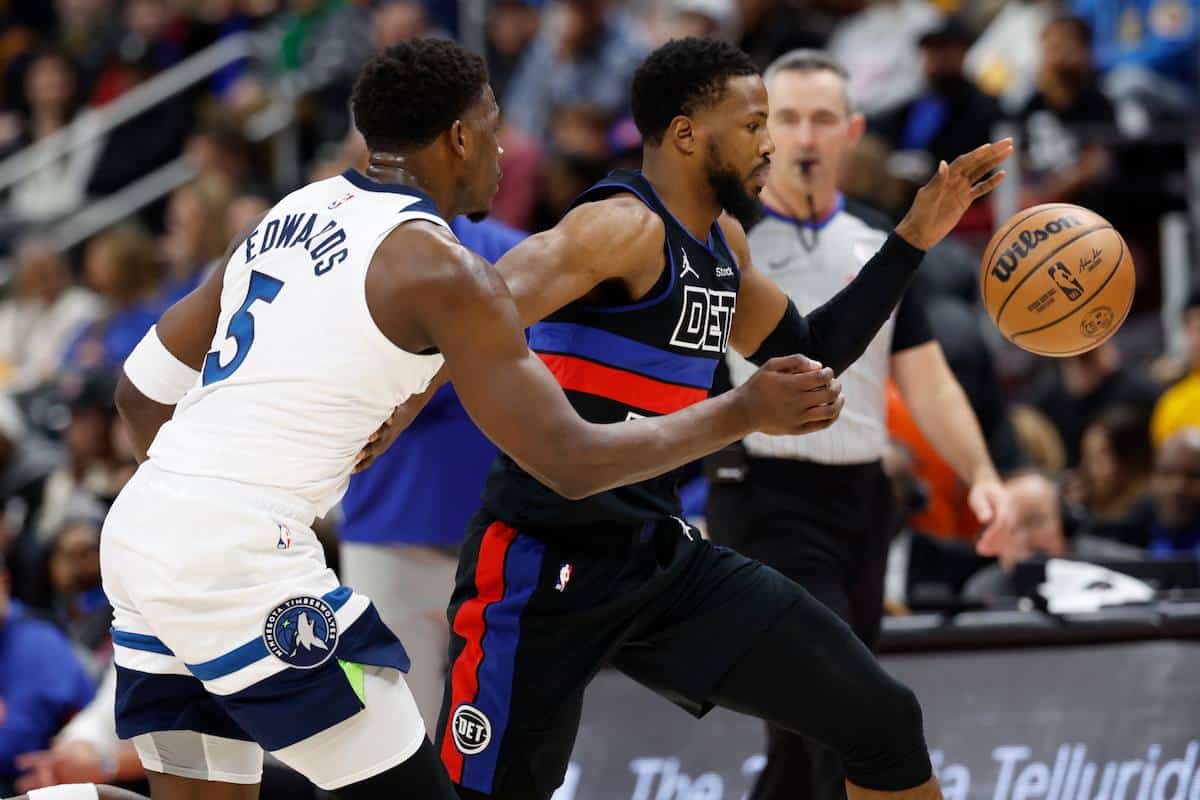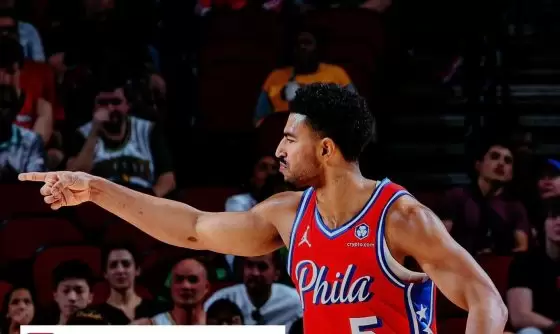Evina Westbrook became a household name in college basketball when she stepped foot on Tennessee’s campus as a top recruit in 2017. After two stellar seasons as the Volunteers’ starting point guard, she put her name in the transfer portal with only one school in mind: the University of Connecticut. She’d spend the 2019-2020 season redshirting and rehabbing a surgically repaired knee before becoming a major piece to a Huskies squad that reached the Final Four. Upon graduating from UConn, she’d take her talents to the W where she was drafted 21st overall by the Seattle Storm, making history as the first-ever Mexican-American to play in the League. She’s currently with the Los Angeles Sparks and relentlessly working toward a breakout season.
While on her way to a workout, Evina spoke with me about her upbringing, recruitment, trusting the process, making history, being a hip-hop producer in her past life, interning with the Portland Trail Blazers, and more.
CURTIS: How are you doing? How’s the off-season been treating you?
EVINA: The off-season has been really good. I definitely miss playing, but I’ve just been getting my workouts in crazy. I either work out in Portland or Eugene. And I live in Salem, so I’m an hour from both. It’s just like, I’ve got to get it in regardless. And I feel really different this off-season, I feel really different.
CURTIS: You grew up in a basketball family; can you talk about your family’s introduction to the game?
EVINA: Basketball was the only sport my family ever played; my mom was the only person in my family who didn’t. My dad played at OSU and overseas. All my brothers played. My younger brother plays. So it’s like basketball is just what it is.
CURTIS: So what was the moment when you knew you were special and knew you were different from your peers who you were competing against?
EVINA: I grew up playing with boys. When I was getting really good with my boys team, we would have parents from the other teams complaining like they didn’t want a girl on the team. It’s like you’re getting mad that I’m a girl, but I’m beating your son’s ass. When it got to that point it was like, ‘okay, I think we got something special.’ My coach growing up always told me that I was gonna get a scholarship from anywhere I wanted to, that I was gonna go to UConn, that I was gonna win a national championship. He literally spoke it into existence. It was just all coming true because of all the work I put in.
CURTIS: Piggybacking off of that, coming out of high school you were a top two prospect in the country. Can you speak to the preparation that’s necessary to reach that point? What did your day-to-day look like growing up as you were becoming the most sought after recruit?
EVINA: Thinking back on it now, it was kind of crazy–like the type of day-to-day I was having, especially at a young age. And coaching kids now, I feel like they don’t do what I was doing and just kind of eat, live and breathe basketball. I just loved the game. I loved the game to a point where I felt myself getting better and I didn’t want to stop. I would wake up and my coach–his name is Price–would pick me up from my house. Me and my brothers would go to the gym and get it in at like 6 a.m. Then he would take us to the donut shop, we would all go to school, and after school I would find some way to the gym. If my parents were at work and couldn’t take me, I would walk like an hour to the gym. And I would be there until like 10 o’clock and I wouldn’t leave. I missed out on a lot of things, but back then it was like I didn’t want to be anywhere else. The gym was my safe place, so I was just there all the time and I was good there.
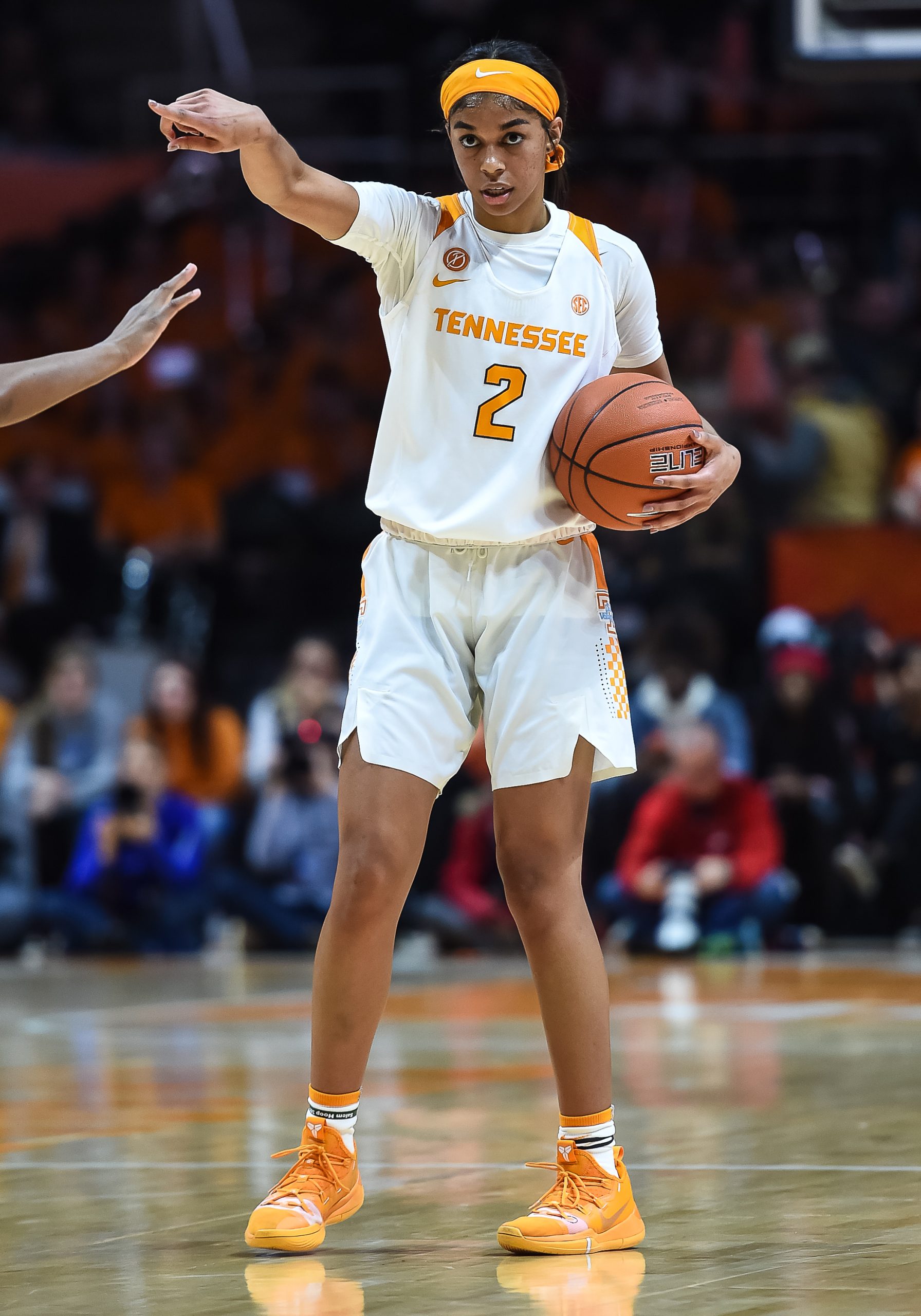
CURTIS: How did your recruitment out of high school unfold, what made Tennessee the right choice initially?
EVINA: Basketball-wise Notre Dame was where I wanted to go. But the school part, I was like nah this isn’t gonna work. I remember going on an unofficial visit to Stanford as a freshman and as soon as we were walking away from the coach, my mom and I looked at each other and I was like, ‘this ain’t it.’ There was nothing wrong with it, it just wasn’t for me. Then when I got down to my top five, there were definitely a couple of schools I didn’t want to tell no. I felt like at the time, Tennessee had everything that I wanted. They had a Black cultural center. I’m like, ‘this is where I’m supposed to be, my people are here, I feel at home.’
CURTIS: So after having two impactful seasons, you decided to transfer; what went into that decision and why UConn?
EVINA: There was just a lot of stuff going on at Tennessee. I still have no regrets. I’m still super thankful that I went there and spent my time there. I met some incredible people who I still talk to. And it’s not like I wasn’t getting playing time. I was the starting point guard both years, leading the team in scoring and assists. I told myself I never wanted to be the kid to transfer and go to another school. After my first year, there was so much going on outside of basketball that was affecting us on the court. But I wanted to stick it out and do whatever was possible to make things better. But then it got worse. I didn’t feel like we had a true culture. The year I transferred was the first year of the transfer portal. I put my name in the portal and my AAU coach was in contact with UConn. I had a lot of schools reach out but I was turning people down left and right. I pretty much knew where I wanted to go. I didn’t want this elaborate process. I knew if I had a good official visit that I was gonna commit on the spot.
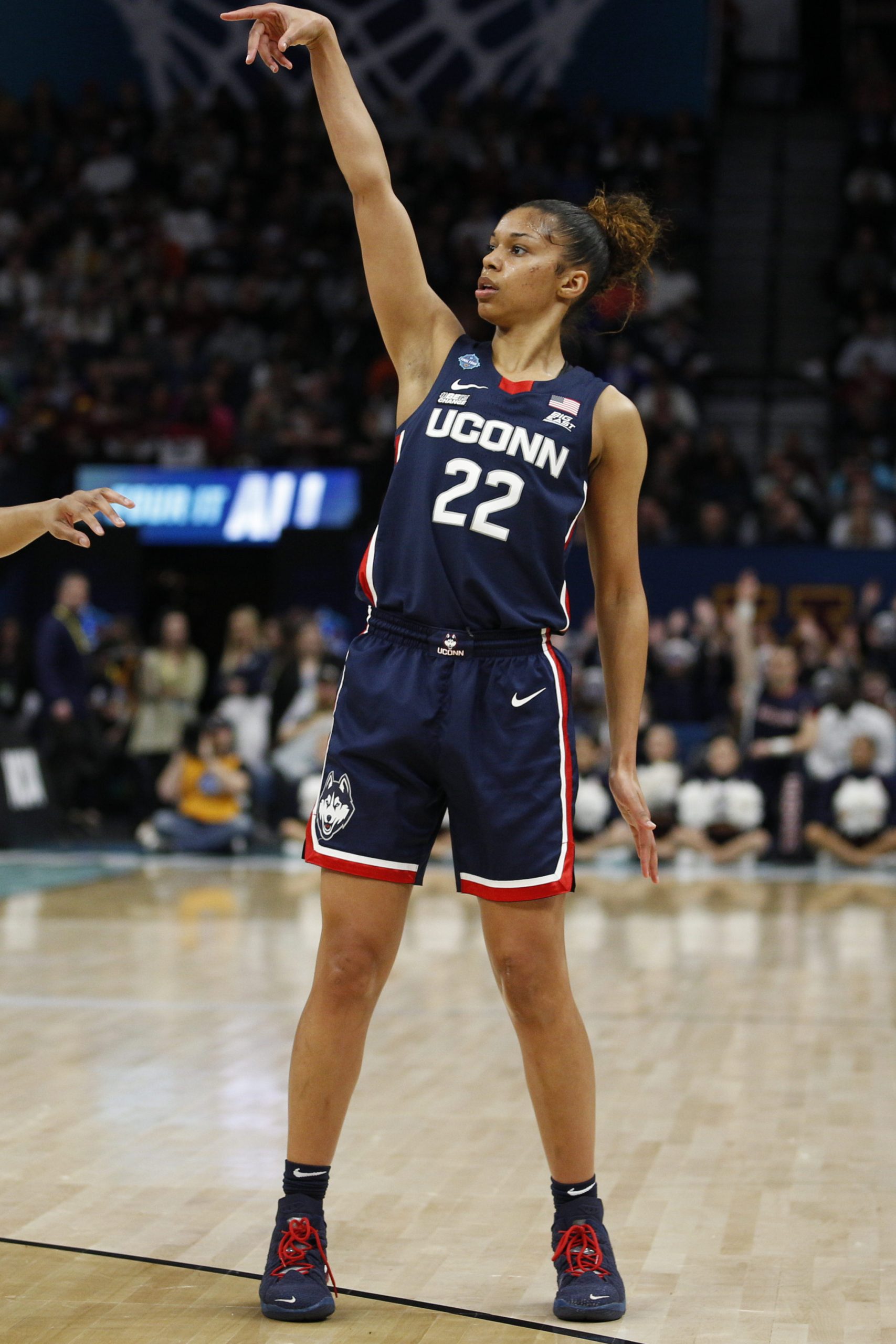
CURTIS: After two great years at UConn, it was time to decide what your next steps were. Did you consider using the extra year of eligibility that was granted as a result of COVID?
EVINA: Hell no, I was ready to go [laughing]. Five years was already too much. I had a really good redshirt junior year, I really almost left after that. I played super well in the tournament and they had me projected in the top ten, but we didn’t win. We lost in the Final Four. Me being stingy, I was like we got unfinished business and ended up coming back the next year, which I don’t regret either.
CURTIS: How did your time at UConn prepare you for the W?
EVINA: Honestly, the transition from UConn to the pros was pretty easy, and I think it’s because we have a pro-like system already embedded in UConn. Both on the court and off the court, at UConn, we have to dress and present ourselves a certain way. It was annoying at times, but then you get to the league and it’s like, ‘oh shit, this makes sense.’ So transitioning, I don’t think was hard at all. But it was definitely different in knowing there’s only 12 teams and barely 12 roster spots. There’s only about maybe three people on each time with guaranteed contracts. You’re coming in thinking they’re gonna keep you, but they don’t care where you come from. Sometimes it’s not even about whether you played good or bad. For example, when I got drafted to Seattle, it was the perfect team, perfect situation, wrong time. But it’s like you just gotta keep it pushing. And it’s hard for a young player to jump around. I’ve been on five different teams in two years.
CURTIS: Can you speak to trusting the process and what that looks like for you?
EVINA: It’s definitely been a journey and it’s super tough not letting your mind get to a point of thinking you’re not good enough. But everywhere I’ve been, every place I’ve been to, I’ve continued to put the work in, whether I was playing or not. You just gotta keep your mind into it. All the work I put in helps me never waver from knowing I’m good enough and belong in the league. I’m getting better. I’m gonna get my time at the right time. And I think when you just continue to put the work in–like especially this off-season, I just feel different.
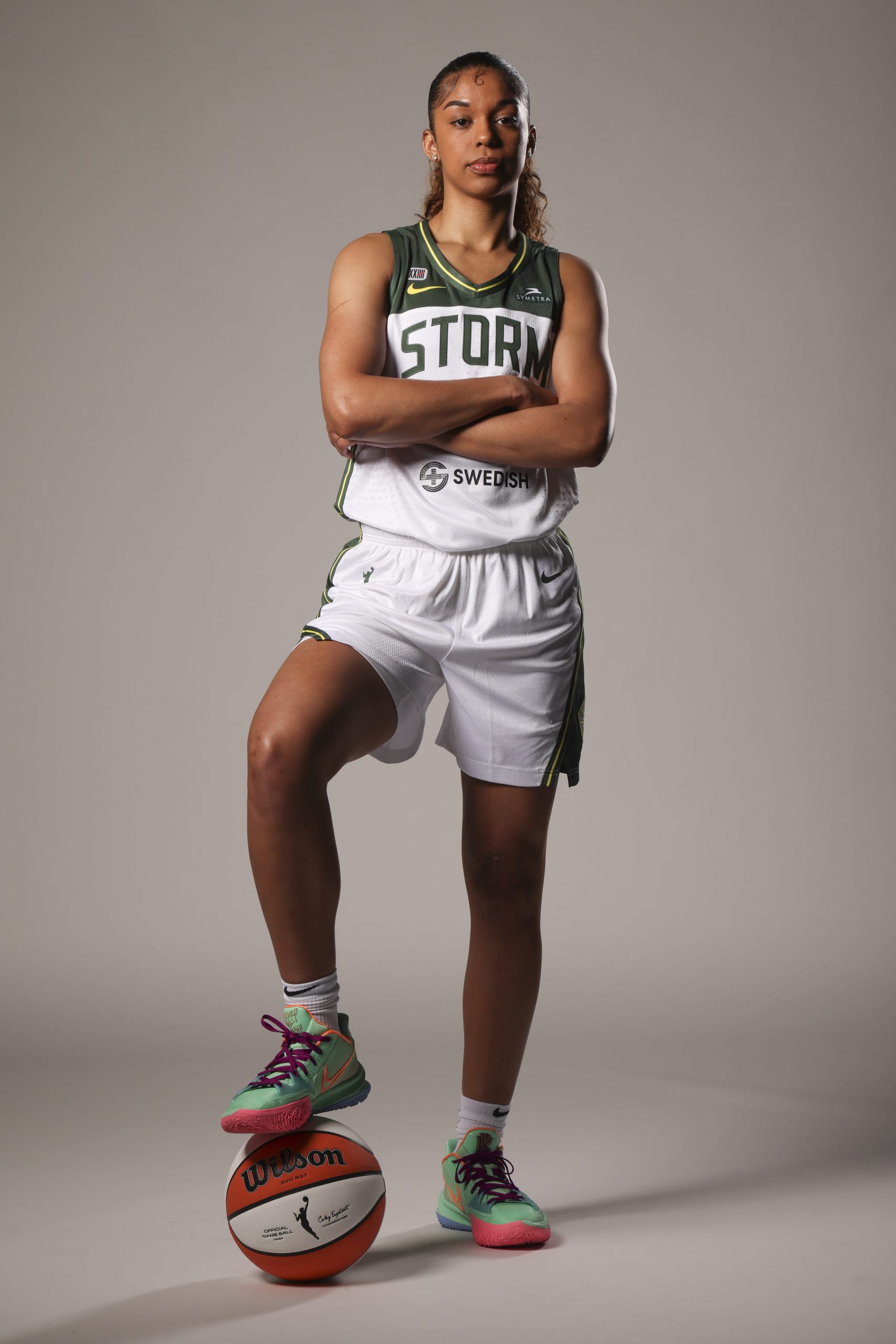
CURTIS: What do you like to do when you’re not hooping?
EVINA: I love music. I’m listening to music all the time. All the different words, the different beats. Maybe I was a producer in my past life. Either that or a mob wife, I think [laughing]. But yeah, I love listening to music and just vibing for real. I like going to concerts. I just be chillin’, watching movies. I don’t really be on nothing crazy.
CURTIS: Who are your favorite hip-hop artists?
EVINA: Probably Kendrick right on top of Cole. But then sometimes I’ll throw in Young Dolph or BigXThaPlug, like the Tennessee will come out, you feel me? It really depends on what my mood is. Sometimes Dame D.O.L.L.A will be in the mix. Dame can really rap.
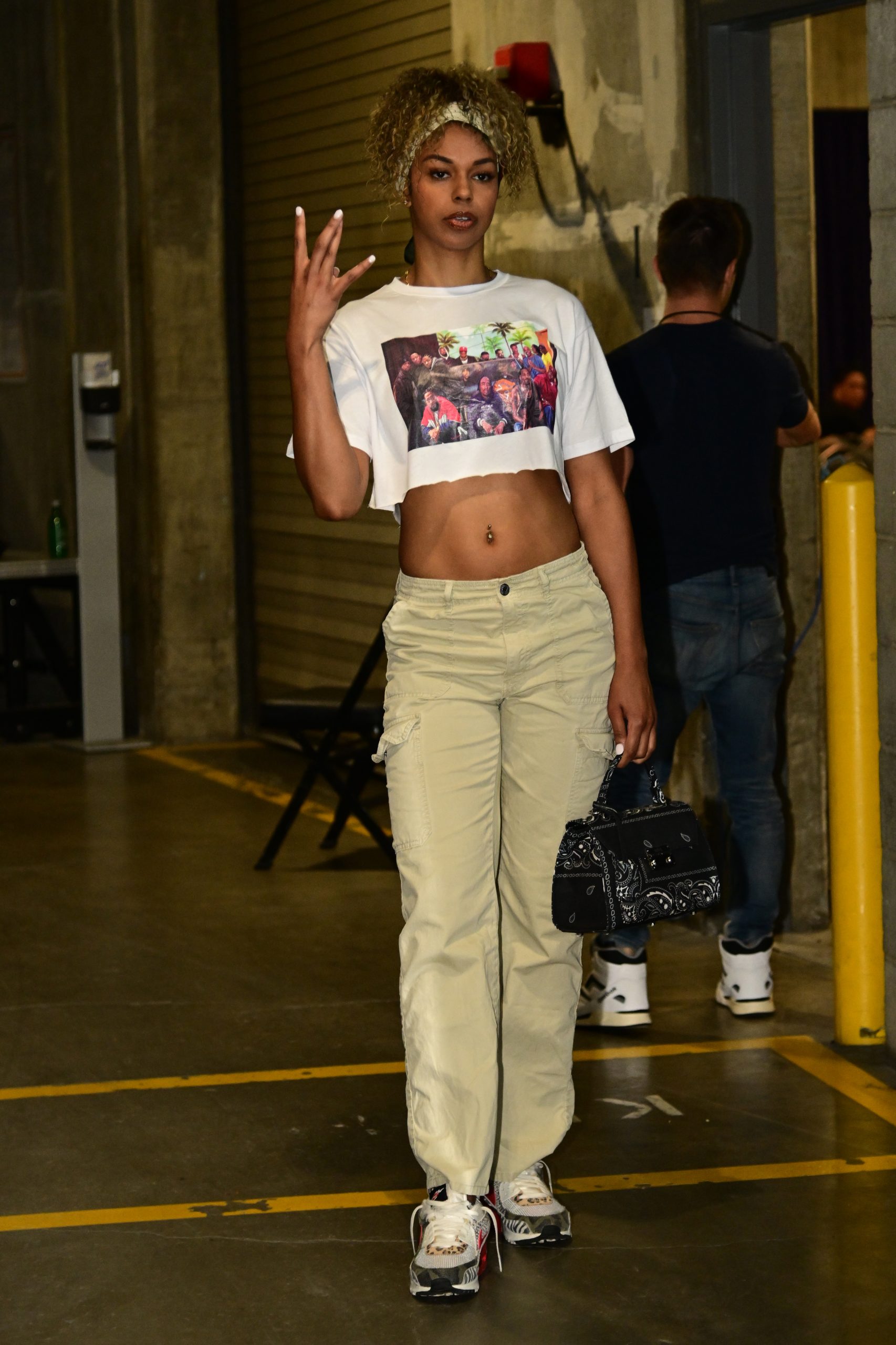
CURTIS: Apple Music or Spotify?
EVINA: I’m an Apple Music girl.
CURTIS: What’s your Apple Music replay looking like, who’s at the top?
EVINA: It’s pretty versatile. I know Larry June got it. I’ve been listening to him like crazy. His album that came out this year is probably my favorite from top to bottom. I listen to a lot of Mexican music trying to work on my Spanish a little bit.
CURTIS: Oh wow, that’s a perfect segue because I wanted to ask you about that. You are the first, and only, Mexican-American to be drafted in WNBA history and be playing in the League. Can you talk about your roots and what it was like when you first found out that you’d made history?
EVINA: I think it was my mom who told me because someone had said it on Twitter. She was like, ‘I didn’t know you were the first Mexican-American to be drafted.’ Man, when I got my Mexican passport, I cried, like literally tears coming out my eyes. Just because it means so much to me. I’m half Black, half Mexican and all my life, because I may not appear as a Mexican, people didn’t believe me. So when I got my passport, I’m like you can’t tell me shit, this is legit. I’m really Mexican, my mom is full Mexican. So just being able to have that passport, how much it means to my family, it really does mean a lot to me. Hopefully, one day I’ll be able to put a Mexico jersey on.
CURTIS: How has your identity shaped you as a person?
EVINA: Just feeling the love from my family–I think that’s what it’s about, right? They come up to me and tell me I make them proud. They tell me to keep going and that I give them hope and just a different perspective. I’m like ‘damn, really? I’m just putting the ball in the hoop.’ When I hear them talk to me like that, it’s just like I don’t ever want to stop–knowing the impact I have on my family and for the people who always believed in me. I played down there this past year and that was super cool. And I think that’s the main reason why I’m trying to learn Spanish now. That’s definitely my goal. I told all my Mexican teammates to only speak to me in Spanish. That’s the only way I’m going to learn.
CURTIS: I read that you interned with the Portland Trail Blazers. What was that experience like: what’d you do, what’d you learn? There’s a wave of W players really emerging in the NBA/media space. Can you talk about why you chose to intern with the team, and what some of your off-court aspirations are?
EVINA: I was an intern for basketball operations. I was learning everything–salaries, salary cap, contracts, scouting. There are so many layers to it. I learned how to cut up film. I was helping with warmups and a bunch of other stuff. It was a huge learning process, just to kind of see the other side of things. I’ve been the player, so not being on the player’s side of things was different. The money the NBA is playing with is totally different. I’d rather do a 10-day in the NBA than a full season in the W [laughing]. But yeah, I wanna hoop as long as I can, but I wanna have other stuff going while I’m hooping.
CURTIS: Last question: What’s one thing people would be surprised to know about you? Could be anything.
EVINA: Maybe that I have a big and pretty funny personality, just not taking life too serious[ly]. People around me are like, ‘I didn’t think you were gonna be like this, I thought you were just a cute face.’ I hate people like that. You know, she or he looks good or looks cool, but their personality is trash. I never wanted to be that type of person.
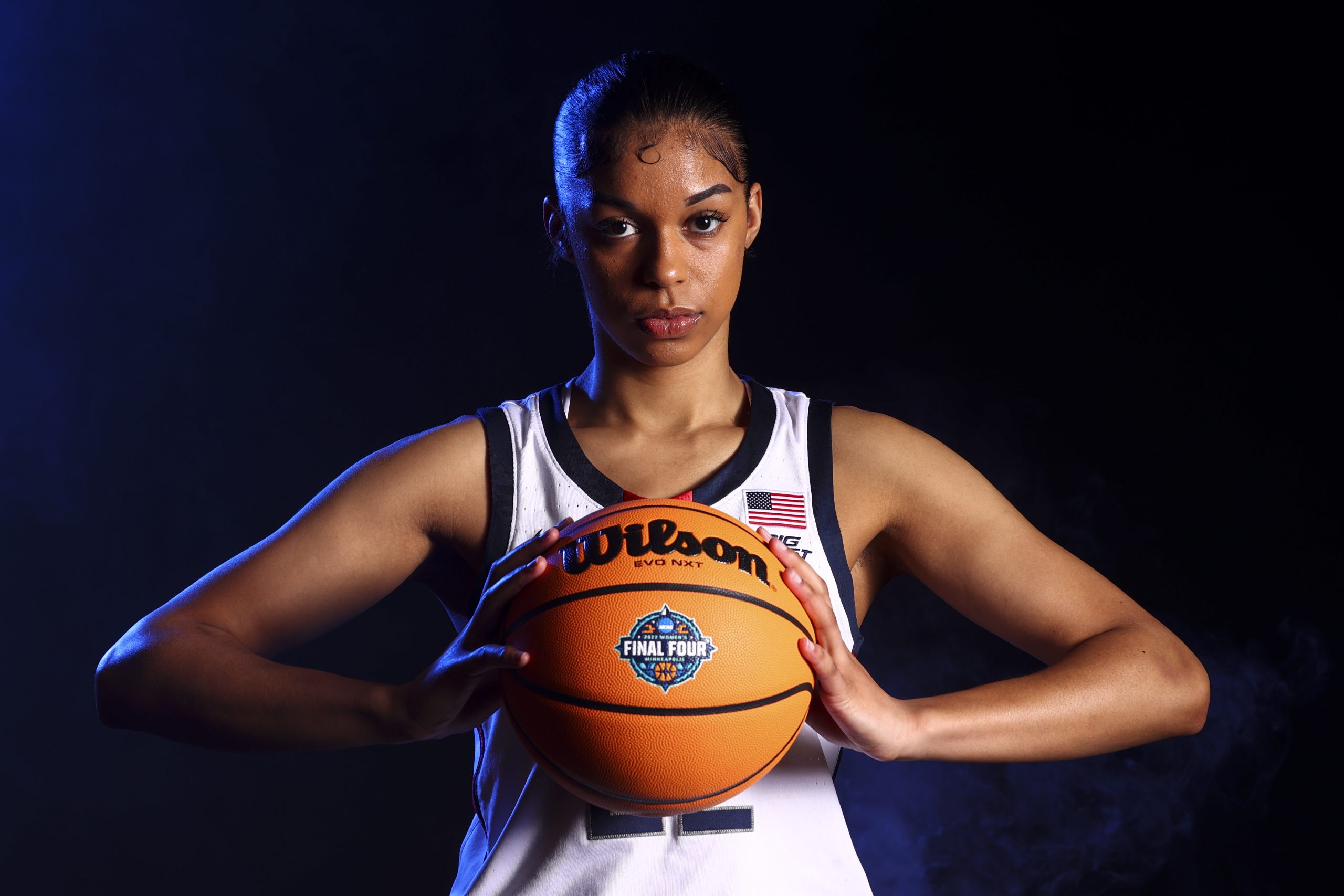
Photos via Getty Images.
As always, here’s the official Hoops, Rap and Everything Black playlist. It’ll be updated weekly with each column. Add the playlist to your library to stay in the know, and be sure to follow SLAM on Spotify.



